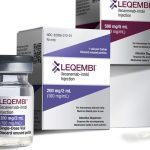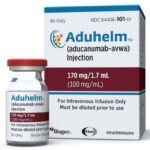Why Leqembi and Aduhelm May Not Be Available To Some Patients With Alzheimer’s Disease

Alzheimer’s disease is a debilitating neurodegenerative disorder characterized by the progressive deterioration of cognitive functions, primarily memory, thinking, and reasoning. It is the most common cause of dementia, a term used to describe a decline in cognitive abilities that significantly impairs daily functioning. The disease is marked by the accumulation of abnormal protein deposits in the brain, including beta-amyloid plaques and tau tangles, which disrupt communication between brain cells and ultimately lead to their degeneration. As the disease advances, individuals often experience a range of symptoms, including memory loss, confusion, personality changes, and difficulties in communication and performing routine tasks.
Alzheimer’s disease is a widespread and growing health concern globally. An estimated 5 to 10% of people aged 65 and older were affected by Alzheimer’s disease. With an aging global population, the prevalence of the disease has been steadily increasing. The impact of Alzheimer’s extends beyond the individuals diagnosed, affecting their families, caregivers, and healthcare systems. Researchers continue to work on understanding the underlying causes, developing early diagnostic methods, and seeking potential treatments or interventions to slow down or halt the progression of this devastating disease. However, 2 newly approved medications may not be available to all patients.
Why Leqembi and Aduhelm May Not Be Available to All Alzheimer’s Patients
Two recently approved treatments, Leqembi and Aduhelm, have brought hope to patients in the early stages of Alzheimer’s disease. However, a new study reveals that many potential beneficiaries may be ineligible due to strict clinical trial criteria. Alzheimer’s affects a significant portion of older Americans, with about 6.7 million individuals aged 65 and above being affected. Nevertheless, the eligibility criteria set by clinical trials for Leqembi and Aduhelm show that only a small percentage of those with early signs of the disease would meet the requirements.
Leqembi and Aduhelm are both monoclonal antibody treatments for Alzheimer’s disease. Due to the urgent need for effective treatments, they received accelerated approval from the U.S. Food and Drug Administration (FDA). Leqembi even received traditional FDA approval in July. Dr. Vijay Ramanan, an assistant professor of neurology at the Mayo Clinic, emphasizes the significance of these new medications in the Alzheimer’s treatment landscape. Leqembi has been shown in clinical trials to delay the progression of the disease, offering a positive step forward.
The study involved analyzing the eligibility criteria using a group of 237 participants aged 50 to 90 with mild cognitive impairment or mild dementia. While approximately 47% of these individuals met the qualifying criteria based on specific inclusion factors, further clinical trial exclusions significantly reduced the eligibility rate. Factors such as stroke, heart disease, history of cancer, or certain brain scan abnormalities resulted in only a small percentage of participants meeting the criteria for Leqembi (8%) and Aduhelm (5%).
The study’s findings emphasize the importance of understanding how well clinical trial criteria apply to the broader population. According to Dr. Stephen Salloway, founding director of the Memory and Aging Program at Butler Hospital, this information is crucial for clinicians. Many individuals who might appear eligible or request treatment may not be appropriate candidates, and aligning treatment conditions with those of clinical trials is vital for effective patient counseling. The study’s insights shed light on the complexities of translating clinical trial results into real-world practice, guiding medical professionals in making informed treatment decisions for Alzheimer’s patients.





